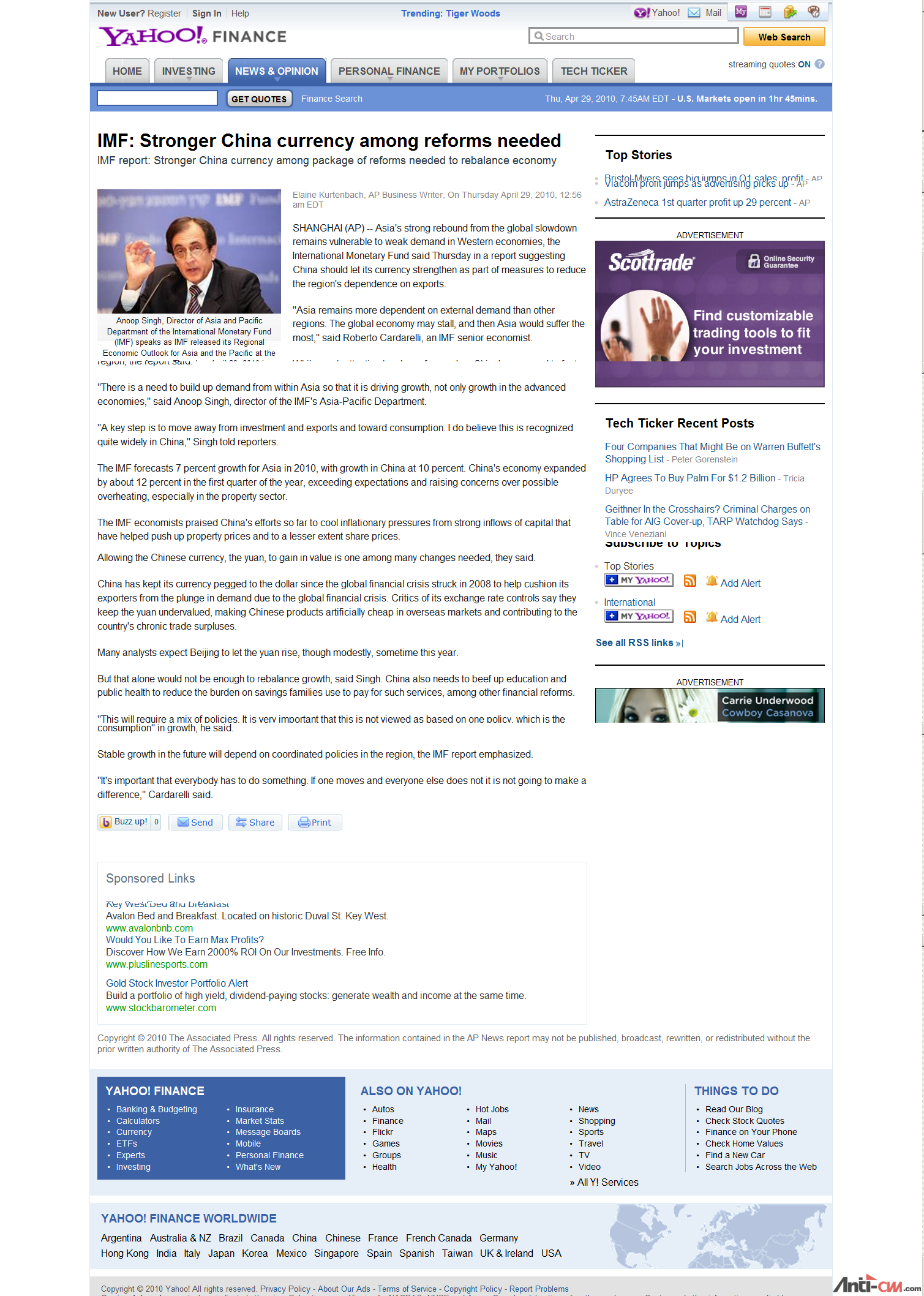|
|
原文链接http://finance.yahoo.com/news/IMF-Stronger-China-currency-apf-3320459742.html?x=0
IMF: Stronger China currency among reforms neededIMF report: Stronger China currency among package of reforms needed to rebalance economy Elaine Kurtenbach, AP Business Writer, On Thursday April 29, 2010, 12:56 am EDT
SHANGHAI (AP) -- Asia's strong rebound from the global slowdown remains vulnerable to weak demand in Western economies, the International Monetary Fund said Thursday in a report suggesting China should let its currency strengthen as part of measures to reduce the region's dependence on exports.
"Asia remains more dependent on external demand than other regions. The global economy may stall, and then Asia would suffer the most," said Roberto Cardarelli, an IMF senior economist.
While much attention has been focused on China's own need to foster stronger domestic demand to help rebalance its huge trade surpluses with the U.S. and other nations, reforms are needed across the region, the report said.
"There is a need to build up demand from within Asia so that it is driving growth, not only growth in the advanced economies," said Anoop Singh, director of the IMF's Asia-Pacific Department.
"A key step is to move away from investment and exports and toward consumption. I do believe this is recognized quite widely in China," Singh told reporters.
The IMF forecasts 7 percent growth for Asia in 2010, with growth in China at 10 percent. China's economy expanded by about 12 percent in the first quarter of the year, exceeding expectations and raising concerns over possible overheating, especially in the property sector.
The IMF economists praised China's efforts so far to cool inflationary pressures from strong inflows of capital that have helped push up property prices and to a lesser extent share prices.
But China needs to go further in reforms aimed at reducing high levels of savings among both households and companies, increasing purchasing power among its consumers that can in turn drive further strong domestic growth.
Allowing the Chinese currency, the yuan, to gain in value is one among many changes needed, they said.
China has kept its currency pegged to the dollar since the global financial crisis struck in 2008 to help cushion its exporters from the plunge in demand due to the global financial crisis. Critics of its exchange rate controls say they keep the yuan undervalued, making Chinese products artificially cheap in overseas markets and contributing to the country's chronic trade surpluses.
Many analysts expect Beijing to let the yuan rise, though modestly, sometime this year.
But that alone would not be enough to rebalance growth, said Singh. China also needs to beef up education and public health to reduce the burden on savings families use to pay for such services, among other financial reforms.
"This will require a mix of policies. It is very important that this is not viewed as based on one policy, which is the exchange rate," Singh said.
"It is fairly clear that a strengthening ... of the currency is part of a package that will increase the share of consumption" in growth, he said.
Stable growth in the future will depend on coordinated policies in the region, the IMF report emphasized.
"It's important that everybody has to do something. If one moves and everyone else does not it is not going to make a difference," Cardarelli said.

|
among, currency, IMF, needed, stronger, among, currency, IMF, needed, stronger, among, currency, IMF, needed, stronger
|